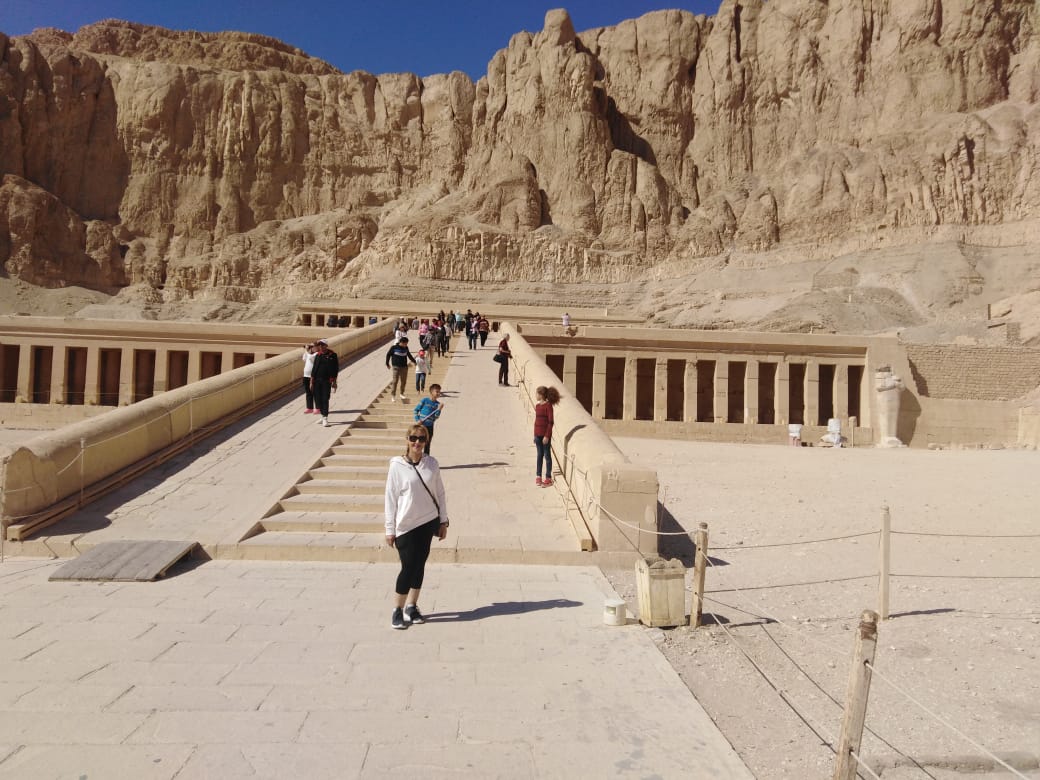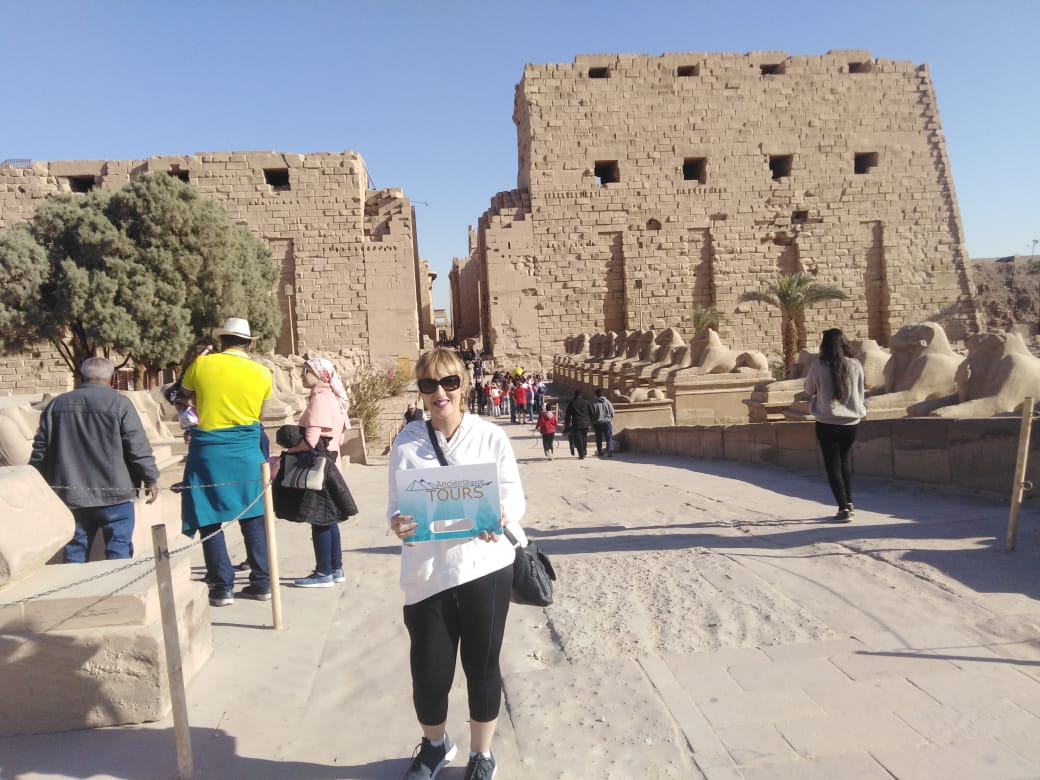from 0 review
8 Hours
Daily Tour
15 people
Deutsche, English, Español, Français, italiano, русский, العربية, 中国語, 日本語
Tour to the East & West Bank
Luxor is in Upper Egypt and the capital of Luxor Governorate. Mainly, it is The East & West Bank. Therefore, Egyptologists have characterized Luxor as the world’s greatest open air museum. This is because of the ruins of the temple complexes at Karnak and Luxor stand tall in Luxor. Across the River Nile lie the monuments, temples and tombs and the West Bank Necropolis, which include the Valley of the Kings and Valley of the Queens. Therefore, we highly recommend a tour to The East & West Bank to visit sites around Luxor in one day.
Karnak Temple
First, in Karnak Temple you will learn about the ancient Egyptian theology and its tight connection with everyday practices. Fortunately, you will see magnificent carvings. These carvings state the importance of the god-king because of his vital role in the connection with the sun. this connection is the essence of God Amun-re.
Luxor Temple
Luxor Temple is also on the East bank where Priests perform the procession of the sun god as it is a walk through different periods of history.
Valley of the Kings
Second, the West Bank in Luxor is the secret resting place of the pharaohs. There they are guarded by underworld protecting gods and hymns from the famous book of the dead. On the the ancient Egyptian artists told the story of the 12 hour journey of the king to defeat evil and generates his power and brings day light again.
Deir El Bahary
Third, the brilliant Egyptian artists depicted the woman king on the walls . She is the famous Hatshepsut as she is the daughter of the supreme god because of her brilliant idea.
Tour to the East & West Bank
To sum up, you should do a Tour to The East & West Bank

Ancient Egypt Tours representative will pick you up from your hotel in Luxor. start your visit in the West bank where you can see the Valley of the Kings was created and used from approximately 1539 BC to 1075 BC. It contains some 60 tombs, starting with Thutmose I and ending with Ramses X or XI. The official name of the site was The Great and Majestic Necropolis of the Millions of Years of the Pharaoh, Life, Strength, Health in The West of Thebes, or more usually, the Great Field. The most famous tomb is KV62, the Tomb of King Tutankhamun. The discovery of King Tut’s tomb was made by Howard Carter in 1922, Tutankhamun’s tomb was the first royal tomb to be discovered that was still largely intact Then you will continue the tour to visit the Hatshepsut temple at El Deir El Bahary, this impressive temple was dedicated to Queen Hatshepsut the only female pharaoh. It rises out of the desert in a series of terraces and merges with the sheer limestone cliffs that surround it. Proceed to the two colossal statues of Amenhotep III, Colossi of Memnon are the two massive stone statues of Pharaoh Amenhotep III. For 3,400 years they have sat in the Theban necropolis, across the River Nile from the city of Luxor. The original function of the Colossi was to stand guard at the entrance to Amenhotep’s memorial temple or mortuary temple Moving to East Bank

The Karnak Temple, the largest place of worship ever built. In ancient Egypt, the power of the god Amun of Thebes gradually increased during the early New Kingdom, and after the short persecution led by Akhenaten, it rose to its apex. In the reign of Ramesses III, more than two thirds of the property owned by the temples belonged to Amun, evidenced by the stupendous buildings at Karnak. Although badly ruined, no site in Egypt is more impressive than Karnak. It is the largest temple complex ever built by man, and represents the combined achievement of many generations of ancient builders. The Temple of Karnak is actually three main temples, smaller enclosed temples, and several outer temples located about three kilometers north of Luxor, Egypt situated on 100 ha (247 acres) of land. Karnak is actually the sites modern name. Its ancient name was Ipet-isut, meaning "The Most Select (or Sacred) of Places". Then move to Luxor Temple. It was built by Amunhotep III in 18th Dynasty in the New Kingdom and it was completed by Ramesses II during the 19th Dynasty. King Ramses II was the most famous king in the 19th Dynasty. He ruled Egypt for about 67 years. It was dedicated to the great god Amun-Ra, his wife Mut and their son Khonsu together representing the Theban triad. Enjoy visiting Obelisk of Ramses II in front of the 1st Pylon. It was called "Ipet resyt", which means the Southern Opet or the Place of the Seclusion of Amun-Re. It was directly connected to the temple of Karnak, the main cult center of Amun-Re or Amun-Min, the sky god or the ithyphallic fertility god. The temple of Luxor has, since its inception, always been a sacred site. After Egypt's pagan period, a Christian church and monastery was located here, and after that, a mosque (13th century Mosque of Abu el-Haggag) was built that continues to be used today, Back to your hotel.
You can cancel up to 24 Hours in advance of the experience for a full refund. For a full refund, you must cancel at least 24 Hours before the experience’s start time. If you cancel less than 24 Hours before the experience’s start time, the amount you paid will not be refunded. Any changes made less than One Week before the experience’s start time will not be accepted. Cut-off times are based on the experience’s local time. This experience requires good weather. If it’s canceled due to poor weather, you’ll be offered a different date or a full refund.